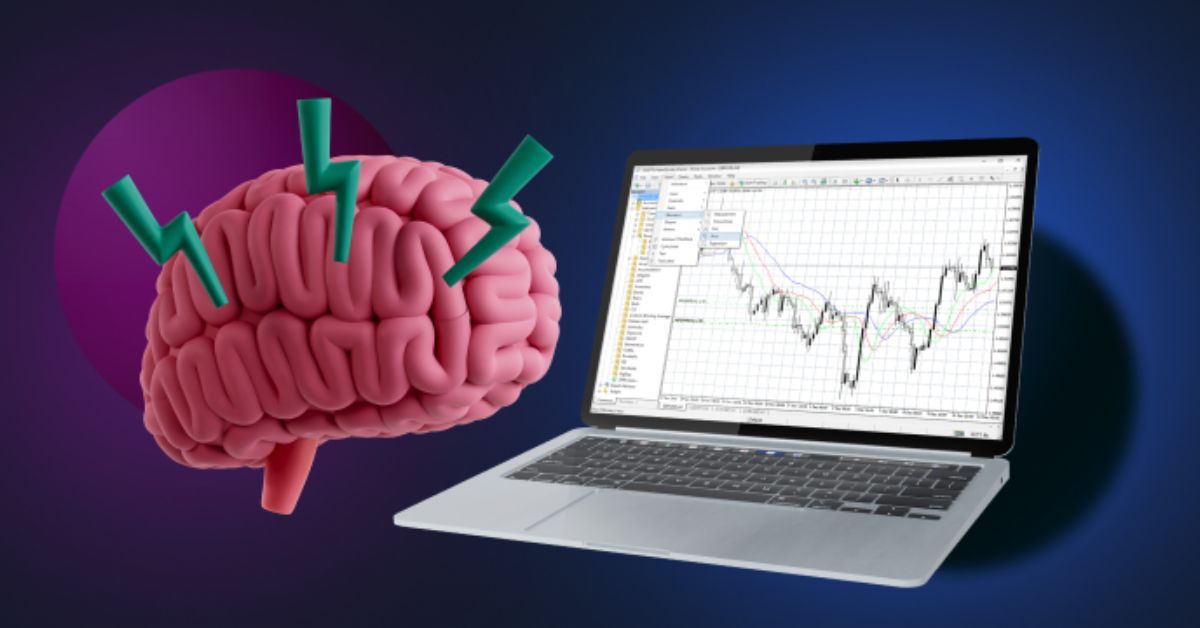Trading success relies heavily on psychological factors, strategies, and market analysis. Emotions, discipline, and mental resilience are crucial in traders’ decisions. Understanding and monitoring trader psychology KPI can greatly enhance trading performance.
This article will explore Key Performance Indicators (KPIs) for trader psychology. Identifying and tracking these KPIs can provide traders with insights into their mental and emotional states, which can make trading more consistent and profitable.
Prime XBT offers traders excellent resources and tools to help them succeed. Traders can maintain a healthy psychological state with its comprehensive features. These platforms can help you make better decisions and trade better. So, join PrimeXBT today! Use promo code PRIMEOTT to receive a +7% bonus on your deposit.
What is Trading Psychology?

Trader psychology refers to the mental and emotional state of traders. It significantly impacts their decision-making processes. Emotions like fear and greed can heavily influence trading outcomes. Recognizing these emotions is crucial for success.
Fear often leads to missed opportunities or premature exits. Greed, on the other hand, can result in overtrading or risky decisions. Stress is another common psychological challenge for traders. High-stress levels can impair judgment and lead to poor choices.
Overconfidence is a frequent issue among traders. It can cause them to take unnecessary risks or ignore their strategies. Maintaining a balanced mindset is essential for trading. Traders must manage their emotions effectively to make rational decisions.
What is KPI in Trading Psychology?
In trading psychology, KPIs measure a trader’s mental and emotional performance. They provide insights into how psychological factors impact trading decisions, helping traders understand their emotional strengths and weaknesses. Tracking KPIs helps traders make better decisions.
Common psychological KPIs include the Emotional Stability Index, Discipline Score, and Risk Tolerance Level. Each KPI focuses on a specific aspect of trader psychology. For example, the Emotional Stability Index measures how well a trader manages emotions.
The Discipline Score evaluates adherence to trading plans and strategies. The Risk Tolerance Level assesses a trader’s ability to manage risk effectively.
Tracking these KPIs involves using various tools and techniques. Journals, self-assessment surveys, and biometric data are commonly used. Regular monitoring helps identify patterns and triggers in trading behavior. This awareness allows traders to address issues proactively.
Why Psychology KPIs are Important for Traders
Psychology KPIs are crucial for traders because they provide insights into the mental and emotional factors affecting trading performance. Let’s explore why these indicators are so important.
Managing Stress and Emotions
Psychology KPIs help traders manage stress and emotions. This management is essential for rational decision-making, as stress and emotions can cloud judgment. By tracking KPIs, traders identify stress triggers. They can then develop strategies to manage these triggers. Effective stress management leads to more consistent trading results. It ensures traders remain calm and focused during high-pressure situations.
Identifying Behavioral Patterns
Tracking psychology KPIs helps identify behavioral patterns. These patterns often reveal triggers for emotional reactions. Recognizing these triggers is crucial. It allows traders to develop effective management strategies. Understanding behavior patterns leads to more disciplined trading. It helps minimize emotional decision-making, resulting in more consistent and predictable trading outcomes.
Building Self-Awareness

Psychology KPIs help traders build self-awareness, which is crucial for growth. Traders become more attuned to their strengths and weaknesses, leveraging strengths and improving weaknesses to enhance performance. Self-awareness also helps in setting realistic goals. It leads to better personal and professional development, which is essential for long-term success.
Improving Risk Management
Understanding emotional responses to risk is vital. Psychology KPIs help with this understanding. Better risk management leads to more calculated decisions, which reduces impulsive trades. Traders can maintain a disciplined approach. Improved risk management enhances overall trading performance. It ensures traders take measured risks. This leads to more sustainable success in trading.
Preventing Burnout
Trading can be mentally exhausting, and unmanaged stress can lead to burnout. Psychology KPIs help track stress levels. Regular monitoring prevents burnout. Traders can take necessary breaks, and implementing stress-relief techniques becomes easier. Preventing burnout ensures traders remain effective. It maintains long-term trading performance. This is crucial for sustained success in the trading world.
Fostering Continuous Improvement
Trading requires constant learning and adaptation. Psychology KPIs foster continuous improvement, and regular assessment helps refine strategies. Continuous improvement leads to long-term success. Traders can adapt effectively to market changes, ensuring sustained profitability. Fostering improvement is essential for staying competitive. It helps traders maintain an edge in the market.
Key Performance Indicators (KPIs) for Trader Psychology
Key Performance Indicators (KPIs) help measure performance effectively and can also assess psychological factors in trading.
Emotional Stability Index
The Emotional Stability Index measures a trader’s ability to manage emotions during trading. Effective emotional regulation is crucial for making rational decisions, and emotions like fear and greed can lead to poor trading outcomes.
Journaling helps traders track their emotional responses. Self-assessment surveys provide insights into emotional patterns. Biometric data, like heart rate, can indicate stress levels. Regularly monitoring these factors helps traders identify emotional triggers. Addressing these triggers leads to better emotional control.
Discipline Score
The Discipline Score evaluates how well traders stick to their plans. Following a trading plan consistently is vital for success. Trading logs document each trade’s details, showing adherence to strategies.
Automated trading systems can enforce discipline by following preset rules. Peer reviews offer external perspectives on a trader’s discipline. Regularly reviewing these logs and systems can identify areas for improvement. Maintaining discipline prevents impulsive decisions that deviate from the plan.
Risk Tolerance Level

The Risk Tolerance Level assesses a trader’s ability to manage risk effectively. Understanding risk tolerance helps in setting appropriate position sizes. Risk/reward ratios indicate whether trades align with the trader’s risk appetite.
Maximum drawdown measures the largest loss a trader can endure. Adherence to position sizing ensures trades stay within predefined risk limits. Regular monitoring of these metrics helps maintain consistent risk management, which is key to long-term trading success.
Stress Index
The Stress Index quantifies the stress levels experienced during trading. High stress can impair judgment and decision-making. Stress questionnaires help identify sources of stress. Physiological measures like cortisol levels indicate stress severity. Heart rate variability can also reflect stress levels.
Monitoring these indicators provides insights into a trader’s stress. Addressing high stress through relaxation techniques can improve performance. Reducing stress leads to clearer thinking and better trading outcomes.
Confidence Index
The Confidence Index measures a trader’s confidence in their decisions. Confidence is crucial for executing trades without hesitation. Self-assessment surveys help gauge confidence levels. Performance reviews provide feedback on decision-making skills.
Coaching feedback offers insights into areas needing improvement. Regularly assessing confidence can identify overconfidence or a lack thereof. Building balanced confidence ensures traders trust their strategies, and confident traders are more likely to stick to their plans.
Focus Duration
The Focus Duration tracks how long a trader can maintain concentration. A sustained focus is essential for accurate market analysis. Time-tracking tools measure how long traders stay focused. Productivity apps can help monitor attention spans.
Self-assessment helps identify distractions affecting focus. Regularly evaluating focus duration highlights areas needing improvement. Improving focus leads to better market analysis and decision-making. Traders with strong focus can react promptly to market changes.
Learning and Adaptability Score
The Learning and Adaptability Score measures a trader’s ability to learn from mistakes. Adapting strategies is vital for evolving market conditions. Performance improvements over time indicate effective learning. Feedback loops provide continuous insights into trading performance.
Completing courses enhances knowledge through educational progress. Regularly assessing adaptability helps traders refine their strategies. Being adaptable ensures traders stay relevant in changing markets. Continuous learning is vital to long-term trading success.
Implementing and Tracking Trader Psychology KPIs
Maintaining a healthy mental state requires effectively implementing and tracking trader psychology KPIs. By monitoring these KPIs, traders can identify patterns, manage emotions, and improve overall performance. Let’s set up a monitoring system, integrate KPIs into daily routines, and adjust regularly.
Setting Up a Monitoring System
A robust monitoring system is essential for tracking trader psychology KPIs. Various tools and technologies can aid in this process. Journals and spreadsheets are simple yet effective tools for recording data. Automated tracking systems provide real-time insights into trading behaviors. These tools help identify patterns and areas for improvement.
Regular monitoring ensures that traders stay aware of their psychological states. Consistent data collection is crucial for accurate analysis. Traders should schedule regular check-ins to review their KPIs. This helps maintain a proactive approach to psychological health.
Integrating KPIs into Trading Routines

Integrating psychological KPIs into daily trading routines is vital. This integration ensures continuous self-awareness and improvement. Traders should start their day by reviewing their KPIs. This sets a mindful tone for the trading session.
It is beneficial to regularly update journals or digital tools with emotional and performance data. These updates provide valuable feedback on current psychological states. Incorporating relaxation techniques, like meditation, can improve emotional regulation. Consistent practice of these techniques enhances overall psychological health.
Regular Reviews and Adjustments
Periodic reviews of trader psychology KPIs are necessary. These reviews help assess the effectiveness of current strategies. Traders should analyze their KPI data weekly or monthly. Regular analysis helps identify trends and potential issues.
Adjustments to strategies based on KPI data are essential. These adjustments ensure continuous improvement in trading performance. Seeking feedback from mentors or coaches can provide additional insights. Professional guidance can help refine strategies and improve psychological resilience.
Challenges in Tracking and Managing Psychological KPIs
Tracking and managing psychological KPIs can be challenging for traders. Many challenges can undermine these practices’ effectiveness. Here are some of the critical challenges and how they impact trading psychology.
Maintaining Consistent Self-Awareness
One major challenge is maintaining consistent self-awareness. The fast-paced nature of trading can make regular monitoring difficult. Traders often get caught up in trading activities, making it hard to track psychological states consistently. Consistency is vital, but it can falter quickly. Busy trading periods exacerbate this issue significantly. Without consistent self-awareness, traders might miss critical emotional signals. This can lead to poor decision-making and increased stress.
Subjectivity of Psychological KPIs
Another challenge is the subjective nature of psychological KPIs. Emotions and stress levels are personal and hard to quantify. Self-assessment surveys and journals rely on honesty. A lack of self-awareness can result in inaccurate data. Traders must be sincere for accurate tracking. Subjectivity can lead to inconsistent data, making analysis difficult. This challenge can undermine the effectiveness of psychological KPIs.
Integrating KPI Tracking into Daily Routines
Integrating KPI tracking into daily routines can be daunting. Balancing trading tasks with psychological monitoring is challenging, and the added effort of tracking KPIs can seem overwhelming. However, this integration is crucial for success. Many traders struggle to find this balance. The effort required can lead to neglecting psychological KPIs. This can result in missed opportunities for improvement and growth.
Technological Barriers
Technological barriers also pose challenges. Many tools and software are available for KPI tracking. Not all traders are tech-savvy, though. Learning to use new tools effectively takes time. This can deter traders from adopting these resources. Technological difficulties can hinder the implementation of effective tracking systems. Overcoming these barriers is essential for leveraging technology in trading psychology.
Emotional Resistance to Acknowledging Weaknesses
Emotional resistance can hinder effective KPI management. Traders may struggle with facing their emotional limitations, which prevents accurate tracking and addressing issues. Overcoming this resistance is vital for growth. Addressing emotional weakness enhances personal and professional development. Emotional resistance can lead to denial and stagnation. Acknowledging and working on weaknesses is crucial for long-term success.
Read More: How Much of Trading is Mental
Conclusion
Psychology KPIs are crucial for traders aiming for consistent success. They help manage stress and emotions, identify patterns, and improve risk management. Tracking these KPIs also prevents burnout and fosters continuous improvement.Are you tired of losing money due to panic selling, FOMO, overtrading, and bag holding?
We recommend the Vestinda trading app to eliminate emotional decision-making with automated crypto trading strategies. It’s easier to achieve better results when focusing on psychology KPIs and using tools like Vestinda.



